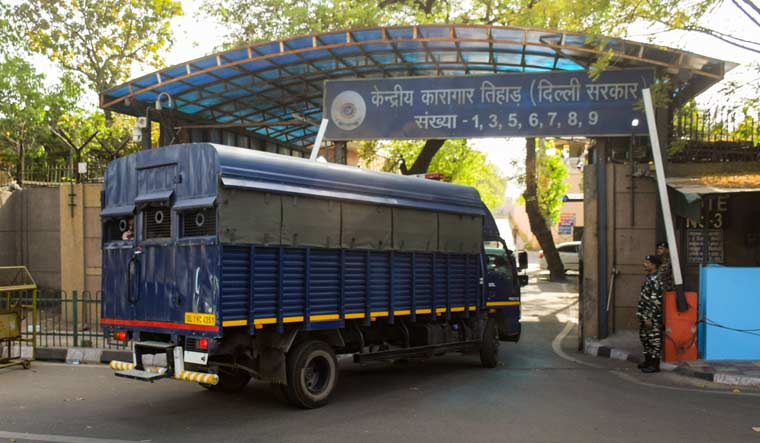NEW DELHI : The Rouse Avenue Court on Sunday sent Delhi Chief Minister Arvind Kejriwal to judicial custody till June 5, 2024 and noted that he has surrendered in the Tihar Jail following Supreme Court directions.
Duty Judge Sanjeev Aggarwal noted that Arvind Kejriwal has surrendered in Tihar Jail, following Supreme Court directions.
The court was hearing an application of ED seeking judicial custody of Kejriwal. The application was pending as Kejriwal was on interim bail.
Today after his surrender, the Duty Judge of Rouse Avenue Court remanded Kejriwal to judicial custody till June 5.
लोकतंत्र बचाने की लड़ाई में जेल जाना मंजूर है लेकिन झुकना नहीं ????????
चेहरे पर मुस्कान और दिल में देशप्रेम का जज्बा लिए तिहाड़ पहुंचे CM @ArvindKejriwal जी ????????????#केजरीवाल_झुकेगा_नहीं pic.twitter.com/tsfvUorWU1
— AAP (@AamAadmiParty) June 2, 2024
The court took up an application filed by ED seeking extension of judicial custody by a period of 14 days. ED had moved the application on May 20, while Kejriwal was out on interim bail granted to him by the Supreme Court.
Advocates Rishikesh Kumar and Vivek Jain, appearing for Kejriwal, opposed the application, stating that his arrest in the case has been challenged before the Supreme Court and order has also been reserved on his petition
On Saturday, the court reserved the order on a fresh interim bail plea moved by Delhi Chief Minister Arvind Kejriwal seeking 7 days of bail citing medical reasons in the Excise Policy money laundering case. The court fixed June 5 for the pronouncement of order on the plea, but refused to pass the order on the same day as requested by Kejriwal’s lawyer.
ED raised the maintainability issue on a fresh interim bail plea and submitted that instead of getting a medical test done, he was travelling across. A medical test would take more than an hour.
Recently, Kejriwal, through his legal team, has filed two different bail applications before the concerned court. His regular bail plea is listed for hearing on June 7, 2024.
Earlier, appearing for ED, ASG SV Raju submitted that he’s campaigning in Punjab. His health did not hinder him from campaigning. Strenuous campaigning has been done. Last-minute bail is being filed. His conduct doesn’t entitle him to any bail.
Kejriwal had earlier moved the Supreme Court for an extension of interim bail. On Wednesday, the Supreme Court rejected his plea, stating that since he was given liberty to move trial court for regular bail, the plea here is not maintainable.
Kejriwal had gotten interim bail from Justices Sanjiv Khanna and Dipankar Datta on May 10 and was asked to surrender to Tihar jail on June 2. On May 17, the bench reserved a verdict on his challenge to the validity of his arrest by the ED in the Excise Policy money laundering case.
The Supreme Court further clarified that since order is already reserved on challenge to arrest, Kejriwal’s plea for extension of interim bail has no relation to the main petition.
On May 28, the Rouse Avenue Court reserved the order on cognizance point on ED’s Supplementary Chargesheet (prosecution complaint) filed against Delhi Chief Minister Arvind Kejriwal and the Aam Aadmi Party (AAP) in connection with a money laundering case related to the Excise Policy case.
The Court, after hearing ED’s submissions, fixed the matter for pronouncement of order on cognizance point on June 4, 2024.
On May 17, 2024, Enforcement Directorate officials along with Special Public Prosecutor (SPP) Naveen Kumar Matta filed the charge sheet in the Rouse Avenue Court of Delhi.
On May 10, the top court granted him interim bail until June 1 in the money laundering case registered by the ED in connection with the Delhi excise policy. However, it ordered that he not visit the Office of the Chief Minister and the Delhi Secretariat. The bench had asked Kejriwal to surrender on June 2.
The apex court was hearing Kejriwal’s appeal against a Delhi High Court judgement that dismissed his plea against arrest by the ED and his subsequent remand in the excise policy case.
Kejriwal, while filing an appeal in the apex court, contended that his arrest after the announcement of the general elections was “motivated by extraneous considerations.”
On April 9, the High Court dismissed his plea for release from jail and rejected his argument of political vendetta amid the looming Lok Sabha elections.
The High Court had said that Kejriwal’s absence from nine ED summons over six months undermined any claims of special privilege as Chief Minister, suggesting his arrest was an inevitable consequence of his non-cooperation.
Kejriwal was arrested by the ED on March 21 in connection with a money laundering probe relating to alleged irregularities in the now-cancelled Delhi excise policy 2021-22. (ANI)





